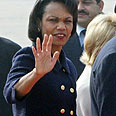
Quartet: US-led Mideast talks 'irreversible'
Foursome of Middle East peace negotiators says there is no turning back from talks between Israelis, Palestinians even though they have failed so far to produce peace agreement. Negotiations launched last November in Annapolis, should be accelerated, group notes in statement
In a statement issued after a meeting of Quartet members – the United States, Russia, the European Union and the United Nations – the group said the negotiations launched last November in Annapolis, Maryland should be accelerated.
"The bilateral negotiations process launched at Annapolis is irreversible and ... these negotiations should be intensified in order to put an end to the conflict and to establish as soon as possible the state of Palestine, living side by side in peace and security with Israel," it said.
The statement criticized both Israel and the Palestinians and urged both sides to do more for the talks.
The group "condemned indiscriminate attacks on Israel" and urged Palestinians to continue work on reforming their security services and to "dismantle the infrastructure of terrorism."
It also urged Israel "to freeze all settlement activities, which have a negative impact on the negotiating environment and on Palestinian economic recovery, and to address the growing threat of settler extremism."
The Quartet also expressed concern about the Israeli blockade of Gaza, saying the provision of humanitarian supplies to Gaza "must be assured continuously." It also called for the immediate and unconditional release of kidnapped Israeli soldier Gilad Shalit.
US Secretary of State Condoleezza Rice spoke about a US-drafted resolution on the Israeli-Palestinian negotiations the UN Security Council is expected to vote on Tuesday.
Progress
Rice said that resolution would "put the international community on record in believing in the irreversibility of the Annapolis process" - a process she has been overseeing.
Rice also dismissed suggestions that the failure to get an Israeli-Palestinian peace deal by the end of the year, as the administration of President George W. Bush had aimed for, meant the process had been a failure.
"They have achieved a good deal of progress in their negotiations, a good deal of progress in the work that is being done on the ground," Rice told reporters after the Quartet meeting. "If that process takes a little bit longer, so be it."
"This is the first time in almost a decade that Palestinians and Israelis are addressing all of the core issues in a comprehensive way to try to get to a solution, and if that process takes a little bit longer, so be it," she said. "But we are very much further along, certainly than we were in 2001, and I would argue even than in 2007 when Annapolis was concluded."
Libya, the only Arab member of the UN Security Council, criticized the US draft resolution for avoiding any mention of specific complaints the Palestinians have raised.
"Ignoring completely what Israel is doing there I think will not help ... support for this draft resolution," Libya's UN Ambassador Giadallah Ettalhi told reporters.
Asked if he planned to vote against the text, Ettalhi said he was still awaiting instructions from Tripoli.
Among the issues he said he would like to see included in the resolution are the blockade of Gaza and settlements.
With most members of 15-nation council backing the text, it will most likely pass even if the Libyans vote against it. But diplomats said they would prefer to have Arab backing and a unanimous vote in favor.
If approved, it will be the Security Council's first resolution on the Israeli-Palestinian conflict since November 2003, when it endorsed the Middle East "road map" peace plan for eventual Palestinian statehood.
Rice, her Russian counterpart Sergei Lavrov and British Foreign Secretary David Miliband are among those expected to attend the council debate on the US draft resolution.
After the Quartet meeting, its members met with the foreign ministers of Saudi Arabia, Jordan, Bahrain, the United Arab Emirates and Morocco, Arab League chief Amr Moussa, and ambassadors from other Arab nations.
Saudi Foreign Minister Saud Al-Faisal told reporters afterwards that the Arab peace plan, which calls for Arab recognition of the Jewish state in exchange for a full Israeli withdrawal from all lands captured in the 1967 Mideast war, "is still on the table and it is a generous offer that deserves a reply."
"We don't want negotiations for the sake of negotiations," he said. "We want results, and regrettably, we were not able to achieve any breakthrough in any of the fundamental issues such as borders, withdrawal and settlements."
Russia's Foreign Minister Sergey Lavrov said the resolution to be voted on Tuesday is aimed at creating two states, Israel and Palestine, living side by side in peace.
"It is aimed at continuing our joint efforts and implementing them, taking into account the recent reaffirmation by the Arab League of the Arab peace initiative which we view as having great capacity," he said.
Reuters and the Associates Press contributed to this report










